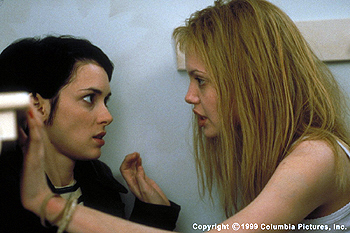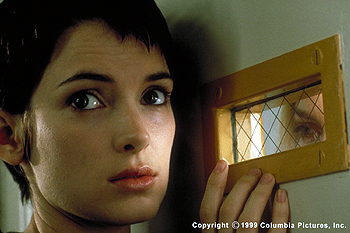

Actual events in the life of author Susanna Kaysen provide the inspiration for the new film Girl, Interrupted, based on her best-selling memoir. The book chronicles the two years of Kaysen's life spent in a mental institution shortly after her graduation from high school. Since I have not read the book, I can only review the movie for what appears on the screen, and the end product feels like it is lacking something.
Initially, the reason that Kaysen (Winona Ryder, Lost Souls, Celebrity) is institutionalized is not clear. Scenes from her recent life are shown in flashback sequences that help to flesh out her life, and possibly explain things. She is the only senior in her graduating class who is not going to college. Prior to being sent to the institution, Claymoore, she made an attempt on her life. Once in Claymoore, Kaysen thinks she is there to rest and get herself collected for a short period before returning to her parents. She does not understand the real reason she is there. In Claymoore, she befriends a number of other patients. One in particular, Lisa (Angelina Jolie, Pushing Tin, The Bone Collector), affects her the most. Lisa is a sociopath, not afraid to say what she thinks, and is considered a troublemaker by the staff. Lisa and Kaysen slowly become close friends.
The main focus on the movie is on Jolie and Ryder, who both do good jobs. Jolie in particular looks haggard and strewn out. Many of the other patients in Claymoore, who have equally compelling stories, are introduced and then ignored. As a result, many of the excellent actors are not given the chance to show their talent (Whoopi Goldberg, Jared Leto, and Vanessa Redgrave are two examples). At least one actor, Clea Duvall (The Faculty, The Astronaut's Wife) is given a small role in which she shows some promise, Kaysen's pathologically lying roommate who is obsessed with the books of L. Frank Baum. This is Duvall's first role with some depth to it.
Screenwriter/director James Mangold (Copland, Heavy) stretches the movie out to its two-hour length. There is little tension or drama in the first hour, and then it only shows up intermittently. The same goes for the movement of the story. Aside from one or two events with the patients at Claymoore, life in the institutions seems laid back and pleasant. Also, there is the feeling that Mangold glosses over some of Kaysen's real problems, to make her character seem more sympathetic. The end is somewhat emotional, but the events leading up to it does not do it justice.